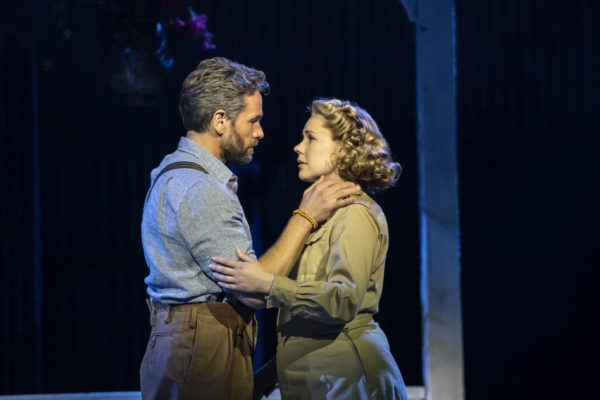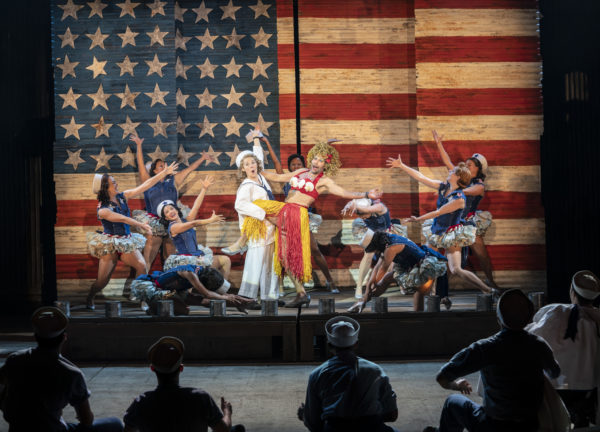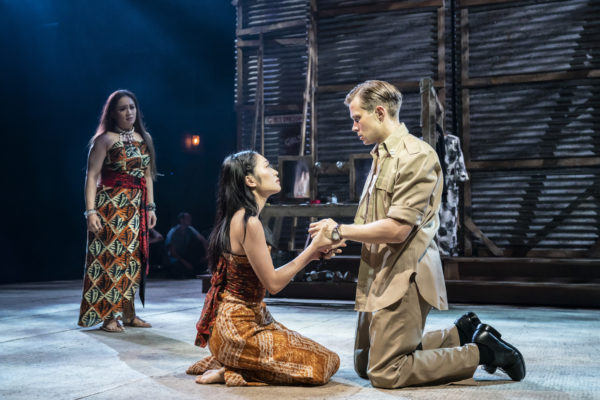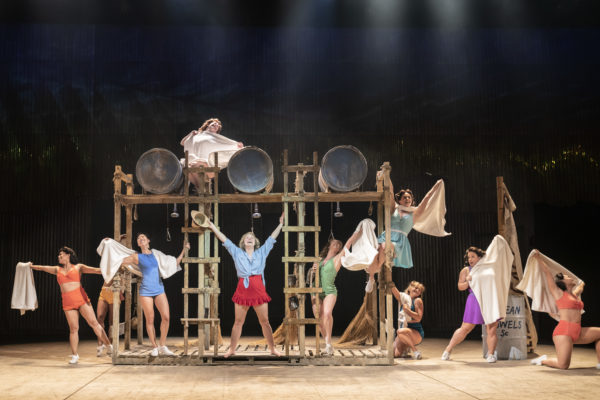
South Pacific deals with lots of interesting issues – and whilst it premiered over 7 decades ago, these issues remain relevant. Whilst Rodgers and Hammerstein established the musical to send a strong anti-racism message – and it infuriated audiences in southern states – contemporary audiences will, of course, take issue with the musical’s representation of race.
The creatives behind this reimagined production, however, have attempted to de-orientalise the musical – to mixed results.
As we saw in Bartlett Sher’s award-winning adaptation of The King and I – which I reviewed in Manchester after seeing it on the West End – it is possible to fix numerous flaws of racially problematic productions, but one can only go so far without completely reinventing the piece. It’s a double-edged sword.
Director Daniel Evans had no easy job: he had to address the huge relevance of the musical whilst confronting its shortcomings – most noticeably, the marginalising of the Polynesian community living around a group of American soldiers. Whilst his attempts to add humanity and autonomy to the Polynesians are not quite as successful as Sher’s deorientalisation of Siam (Thailand) in The King and I, one can appreciated his concerted effort to address the text’s flaws.

Evans makes changes right from the get-go. Whilst the musical traditionally begins with two half-Polynesian children, Ngana and Jerome, playing and singing, he has added a scene in which a young Tonkenese woman, Liat (played by the delightful Sera Maehara), is seen delivering a traditional dance – before the stage is invaded from all sides (two soldiers even sail down from above). What was once a safe, serene space is now occupied and corrupted by American forces. It’s a bold opening that addresses the inhumanity of Western militaries waging war in Eastern countries.
The invasion is brilliantly done. The production, for all its faults, must be applauded for its spectacular set and dazzling design. The score is splendid (obviously – it’s Rodgers and Hammerstein), especially the sprightly scenes featuring ‘I’m Gonna Wash That Man Right Outa My Hair and ‘Honey Bun’ (pictured) – both of them sang by the female lead, Nellie Forbush (Gina Beck), whilst the latter is also sang by Luther Billis.
Dougie McMeekin played Luther Billis at the Manchester press night – and he was both annoying and hilarious. McMeekin is playing Billis at Sadler’s Wells, London, whilst Pierce Rogan is playing the role “at select performances”. The picture below features Keir Charles, from the original Chichester Festival Theatre production last year.

This musical’s introduction is followed by a more grounded scene – but, quite possibly, the strangest opening to a musical I’ve ever seen.
We meet Nellie and Emile de Becque (Julian Ovenden). Beck is known for playing lead roles in various West End musicals, whilst Ovenden’s credits are immense: Foyle’s War, The Royal, Marguerite (original cast), Finding Neverland (original cast), Smash, Downton Abbey, Persons of Interest, Knightfall, The Crown, Bridgerton, and Adult Material.

Whilst Ovenden and Beck are wonderfully cast, the scene is rather boring. There’s lots of exposition. They chat for what feels like forever – before eventually kissing. They also sing a couple of songs. It’s a really long opening scene.
Then de Becque suddenly reveals to a girl he has not known very long at all that he killed a man. He just blurts it out. Weirder – she doesn’t seem too phased about it (though she later has time to process it). It’s the opening scene, but so much is thrown at the audience.
Instead of getting to know the new lovers over the course of a few scenes, we are thrown mid-way into their early relationship and expected to care about the outcome. For us, the audience, there are no stakes, for we have only just met these two characters – neither of whom is particularly enchanting, as of yet. The acting was amazing and the singing was sublime, but it was an odd opening, if nothing else.

The following scene was much more exciting – we met the American soldiers, nurses, and the only Polynesian character that the musical deems important: Bloody Mary (Joanna Ampil). Whilst Bloody Mary is traditionally nothing more than a caricature, this production sees her become a much more nuanced, sympathetic figure. We are forced to understand her struggle – she’s not selling her daughter (the aforementioned Liat) to better her own place in society, but, rather, trying to secure a good marriage (and, thus, a better future) for her daughter.

Joanna Ampil deserves great praise for her three-dimensional portrayal of the criminally underwritten (yet vitally important) Bloody Mary. Ampil is a well-known theatre actor – gaining great attention for originating the role of Kim in the original Australian production of Miss Saigon (after previously playing the role in the West End) – and whilst this is a smaller role than she might deserve, it’s great to see Ampil involved in reclaiming a renowned musical’s racist narrative.

Liat’s love interest, Lt. Joseph Cable, is played by relatively well-known theatre actor Rob Houchen – who, like the other actors I’ve mentioned, starred in the original Chichester Festival Theatre production last year. Houchen is very likeable as Cable – even when he heartbreakingly rejects Liat.

Whilst this production makes some charming changes, the script leaves lots to criticise. I found that the story never really went anywhere in the first act. The production spends a lot of time setting the scene, and I never really cared much about what was going on.
That said, the end of the first act is one one of the best ends to a first act I’ve ever seen. It wasn’t flashy or elaborate; it didn’t end with a Nazi salute or ‘Defying Gravity’. It was much more subtle.
After questioning her relationship with Emile for over an hour, Nellie finally realises and confesses her love for/to him. But it doesn’t last long. The children who we saw at the beginning of the musical return – and whilst Nellie, herself, calls them adorable, her delight comes to an abrupt end when she realises that they are Emile’s children. The problem is not that Emile has children from a previous marriage, nor that he was married before, but, rather, he was married to (and had children with) a “colored” woman.

Right before our eyes, Nellie transforms from a bonny bombshell to a babbling bigot. The protagonist we had grown to love over the first act is revealed to be a raging racist.
When this musical first premiered, this twist would not have come as such a shock to audiences – even lots of “liberal” Americans did not look favourably upon interracial relationships. However, for a modern British audience, the revelation comes as a grave shock. We are forced to question everything that has happened throughout the act. How, we wonder, did we fall for a bigot? The curtain then drops, giving us time to reflect, mourn, and wash Nellie right outta our hair!

Sure enough, Nellie comes around – an ending that liberal White audiences love, but, as a person of colour, I could feel my eyes rolling. It just makes racism look trivial and easy to fix. We are made to see Nellie not as a bad person but an ignorant one – and thus, her racism, though never defended, is explained away.
This fault lies not with the current creatives but the original writers. But it is important to remember that this is a very old musical written by White men. However, we cannot just render it “a product of its time” – for two opposing reasons. Firstly, it is lazy to just dismiss something offensive as such, without engaging with those problems. Secondly, this musical was not merely a product of its time – in actuality, it was radical for its time. It scandalised southern audiences with its strong anti-racist message – and its portrayal of interracial relationships.
For that reason, the musical must be applauded – even if it fell short of offering me an enchanted evening.
South Pacific plays at Manchester Opera House from 16th until 23rd July, ahead of a month-long residency at Sadler’s Wells Theatre in London, from 27th July until 28th August. The UK tour resumes in mid-September until mid-November.







